The Intel Kaby Lake-X i7 7740X and i5 7640X Review: The New Single-Threaded Champion, OC to 5GHz
by Ian Cutress on July 24, 2017 8:30 AM EST- Posted in
- CPUs
- Intel
- Kaby Lake
- X299
- Basin Falls
- Kaby Lake-X
- i7-7740X
- i5-7640X
Benchmarking Performance: CPU Legacy Tests
Our legacy tests represent benchmarks that were once at the height of their time. Some of these are industry standard synthetics, and we have data going back over 10 years. All of the data here has been rerun on Windows 10, and we plan to go back several generations of components to see how performance has evolved.
All of our benchmark results can also be found in our benchmark engine, Bench.
3D Particle Movement v1
3DPM is a self-penned benchmark, taking basic 3D movement algorithms used in Brownian Motion simulations and testing them for speed. High floating point performance, MHz and IPC wins in the single thread version, whereas the multithread version has to handle the threads and loves more cores. This is the original version, written in the style of a typical non-computer science student coding up an algorithm for their theoretical problem, and comes without any non-obvious optimizations not already performed by the compiler, such as false sharing.
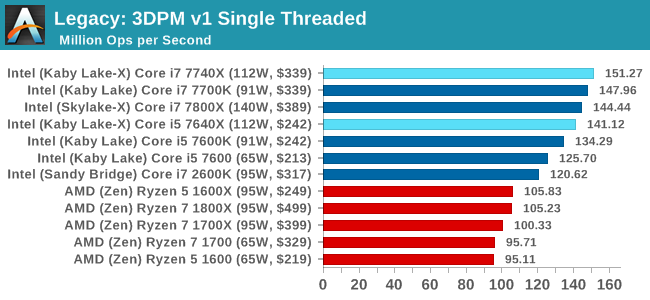
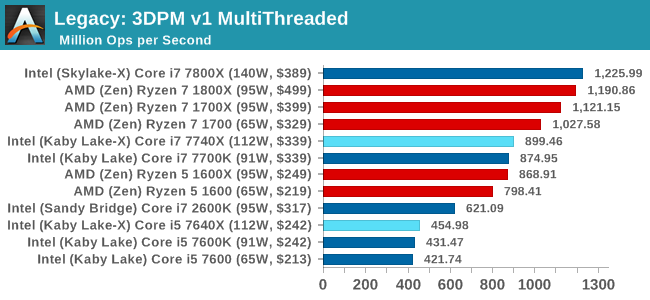
CineBench 11.5 and 10
Cinebench is a widely known benchmarking tool for measuring performance relative to MAXON's animation software Cinema 4D. Cinebench has been optimized over a decade and focuses on purely CPU horsepower, meaning if there is a discrepancy in pure throughput characteristics, Cinebench is likely to show that discrepancy. Arguably other software doesn't make use of all the tools available, so the real world relevance might purely be academic, but given our large database of data for Cinebench it seems difficult to ignore a small five-minute test. We run the modern version 15 in this test, as well as the older 11.5 and 10 due to our back data.
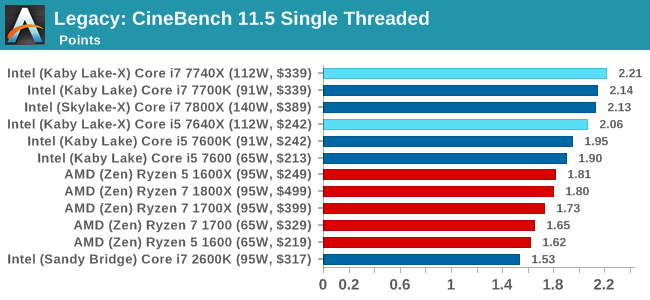
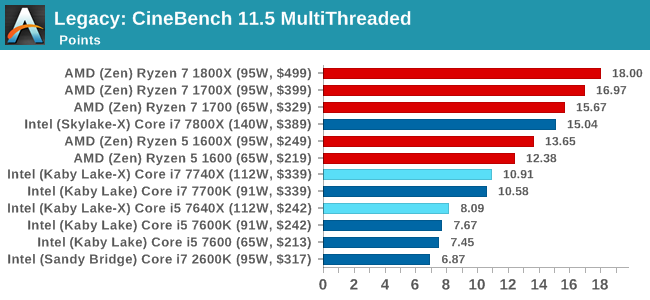
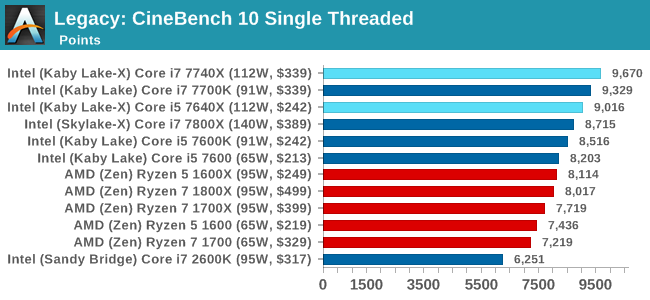

x264 HD 3.0
Similarly, the x264 HD 3.0 package we use here is also kept for historic regressional data. The latest version is 5.0.1, and encodes a 1080p video clip into a high-quality x264 file. Version 3.0 only performs the same test on a 720p file, and in most circumstances the software performance hits its limit on high-end processors, but still works well for mainstream and low-end. Also, this version only takes a few minutes, whereas the latest can take over 90 minutes to run.
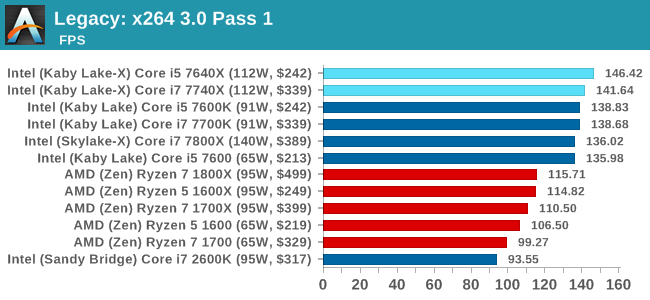
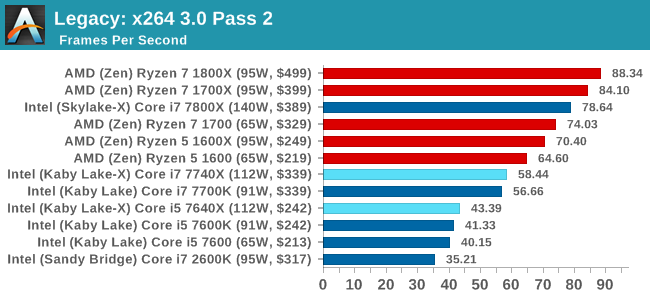










176 Comments
View All Comments
Gulagula - Wednesday, July 26, 2017 - link
Can anyone explain to me how the 7600k and in some cases the 7600 beating the 7700k almost consistenly. I don't doubt the Ryzen results but the Intel side of results confuses the heck out of me.Ian Cutress - Wednesday, July 26, 2017 - link
Sustained turbo, temperatures, quality of chips from binning (a good 7600 chip will turbo much longer than a 7600K will), time of day (air temperature is sometimes a pain - air conditioning doesn't really exist in the UK, especially in an old flat in London), speed shift response, uncore response, data locality (how often does the system stall, how long does it take to get the data), how clever the prefetchers are, how a motherboard BIOS ramps up and down the turbos or how accurate its thermal sensors are (I try and keep the boards constant for a full generation because of this). If it's only small margin between the data, there's not much to discuss.Funyim - Thursday, August 10, 2017 - link
Are you absolutely sure your 7700k isn't broken? It sure looks like it is. I understand your point about margins but numbers are numbers and yours look wrong. No other benchmarks I've seen to date aligns with your findings. And please for the love of god ammend this article if it is.Hurr Durr - Monday, July 24, 2017 - link
One wonders why would you relegate yourself to subpar performance of AMD processors.Alistair - Tuesday, July 25, 2017 - link
Your constant refrain belonged in the bulldozer era (when the single threaded performance difference was on the order of 80-100 percent). Apparently you can't move past the Ryzen launch. If a different company such as Samsung had launched these CPUs the reception would have been very different. I've never bought AMD before but my Ryzen 1700 is incredible for its price, and I had to be disillusioned by my terrible Skylake upgrade first before I was willing to purchase from AMD.Gothmoth - Tuesday, July 25, 2017 - link
don´t argue with trolls....StevoLincolnite - Tuesday, July 25, 2017 - link
Why would Intel enable HT when they could sell it as DLC?https://www.engadget.com/2010/09/18/intel-wants-to...
coolhardware - Tuesday, July 25, 2017 - link
Glad to hear that the benchmarking is (becoming) less of a chore :-) Kudos and thank you for the great article!fallaha56 - Tuesday, July 25, 2017 - link
Surely that AVX drop -10 when overclocking was too much?What about delidding?
Samus - Monday, July 24, 2017 - link
It still stands that the best value in this group is the Ryzen 1600X, mostly because it's platform cost is 1/3rd that of Intel's HEDT. So unless you need those platform advantages (PCIe, which even x299 doesn't completely have on these KBL-X CPU's) it really won't justify spending $300 more on a system, even if single threaded performance is 15-20% better.Just the fact an AMD system of less than half the cost can ice a high end Intel system in WinRAR speaks a lot to AMD's credibility here.